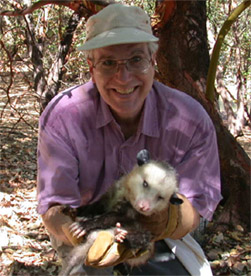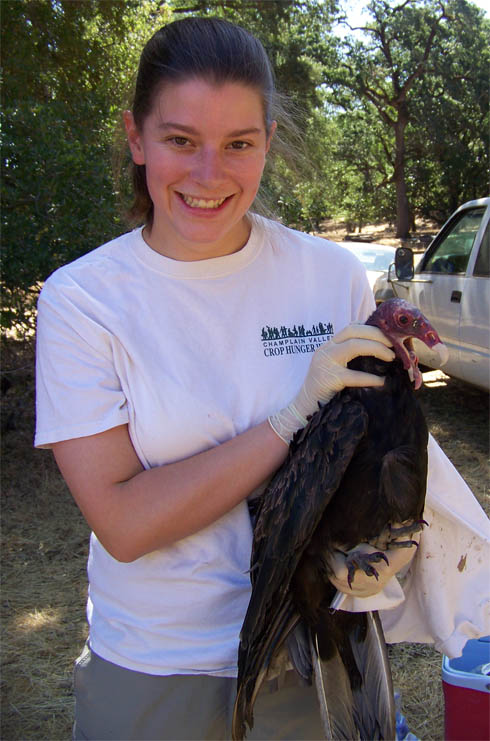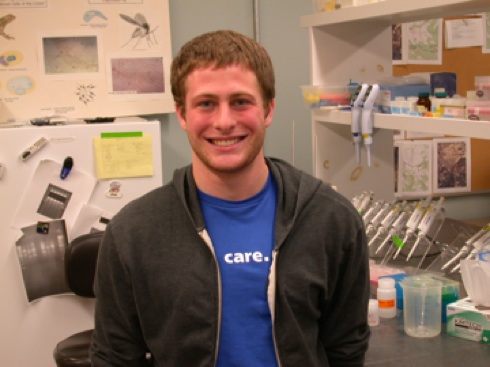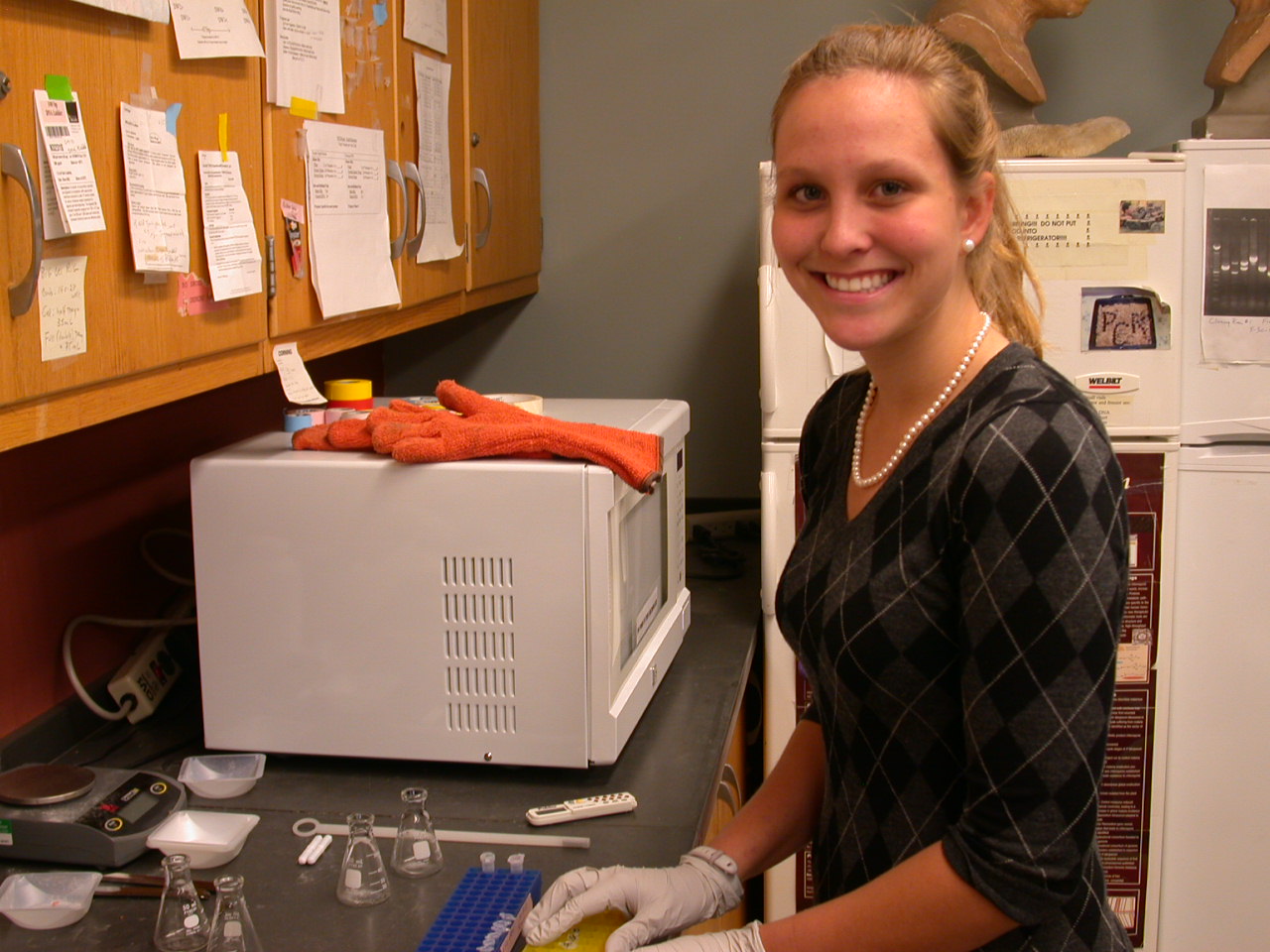|
|
|
|
|
 |
||
| Since 1978, the malaria research lab has always included an active group of graduate and undergraduate students and lab guide Dr. Joseph Schall. The photo was taken one summer day after the first-edition lab t-shirts arrived (there has since been two other editions). On the shirts is seen the most recent, well-resolved, phylogeny of malaria parasites that was recovered in the lab by Ellen Martinsen, now at the National Zoo. A brief biography of each current lab member appears below. Shown above are Nate Hicks who graduated with highest distinction in 2011, Katie St. Denis who graduated in 2010, graduate student Alli Neal, Alice Flynn Ford who graduated in 2010 and is now in an MD/PhD program at the University of Pennsylvania, and Joe Schall. | ||
 |
Jos. J. Schall Professor of Biology University of Vermont e-mail Prof. Schall |
|
Jos. J. Schall has been on the faculty of the University of Vermont since 1980. He received his BS from Penn State, the MS from the University of Rhode Island, and the Ph.D. from the University of Texas. His interests in graduate school were community ecology and geographic trends in species richness. He conducted field work in the diverse Cnemidophorus lizard asemblage in the desert of SW Texas. Some of this work was published with his mentor, Eric Pianka. Schall's interests then shifted to parasites, and he was awarded an NIH individual postdoc at the University of California, Berkeley, where he worked with noted parasitologist John Simmons.
Since 1978 he has conducted a long-term study of the malaria parasites of lizards (in both the lizard and insect vector) at a site in northern California (UC's Hopland Research and Extension Center field station), and several Caribbean sites, including a long-term study on the tiny islands of Saba and St. Martin and the LTER site at El Verde in Puerto Rico. A study in Sierra Leone, west Africa, while productive, had to end because of civil war. HIs current work centers on the biology of another apicomplexan parasite, Monocystis of earthworms. In a break from studies on parasites, he worked with graduate students Denise Dearing and Steve Ressel on diet selection by herbivorous lizards on small Caribbean islands and with graduate student Diane (Cannon) Faile on the nesting behavior of the Pelagic Cormorant.
Schall has been honored by the University of Vermont with the two highest awards for teaching excellence, and the university's highest award for research excellence. His research has been continuously funded for more than 30 years by the NSF, and by the Morris Animal Foundation for studies on avian malaria parasites. His work has resulted in more than 90 publications in major scientific journals. |
|
|
|
 |
Allison Neal Graduate Student in Biology University of Vermont e-mail Allison Visit Alli's website |
Alli entered our graduate program in the fall of 2009, but was already very familiar to the Biology Department. She graduated with her BA in Biology after completing her Senior Honors project in the malaria lab. Each year, the department honors the graduating senior with the highest GPA, and Alli was our 2009 winner! Naturally, we tried to lure Alli into staying on as a graduate student, and were very pleased that she accepted. Alli did field work at the California (Hopland) field site with undergraduate Honors student Jennifer Fricke in the summer of 2008. This jump-started her grad project. Alli has returned to the Hopland site for the full summers of 2009, 2010, and 2012. Her research examines the gametocyte sex ratio of Plasmodium mexicanum, particularly the influence of clonal diversity within an infection on the parasite's sex ratio. She uses a combination of classical parasitological techniques (hundreds of hours on the microscope), modern molecular methods (genotyping infections using variable genetic markers), experimental manipulations of infection diversity, and modeling. Alli demonstrated that there is genetic diversity for sex ratio when parasites are in single-clone infections, only the second time this has been documented (although the effect may be common). That study was published in Parasitology, Alli's first publication. Alli's second publication, also in Parasitology, examined the relationship between the fecundity (number of gametes produced) for male gametocyte cells and infection sex ratio (the relationship matched expectations of sex ratio theory). Her most recent publication, in Evolutionary Ecology used a life history approach to examine interaction of life history traits and the genetic basis for variation in those traits. Alli has received three wonderful honors: She was awarded the EAPSI NSF summer fellowship to study with Robert Poulin in New Zealand, and received a National Science Foundation Graduate Fellowship for three years which is perhaps the highest honor for a science graduate student. Her work with Dr. Poulin centered on how the larvae of a marine trematode worm finds its preferred substrate, and resulted in a publication in Journal of Parasitology. Most recently, Alli was awarded the NSF Dissertation Improvement Grant to study genetic variation in the vector of Plasmodium mexicanumAlli is also an avid teacher, and has volunteered at a local Middle School, and has taken a series of undergrad and high school researchers under wing both in the field and the lab. She was invited three years in a row to give the plenary lecture to the incoming Honors College students, and has represented the department at a grad school fair in Boston. |
|
 |
Max Ross Senior Undergraduate Research Student University of Vermont e-mail Max |
|
Max, a Biology major with History minor, was a student in the Ecological Parasitology course in his Junior year and more-or-less moved into the research lab to help with research on Monocystis. He then wrote a proposal for a summer research fellowship from the university and was one of only a very few awarded! Max just about lived in the lab all summer, and moved on to his Senior research project in the fall. Max is one of those researchers with the magic touch: everything he works on in the lab yields great results. For his Senior research project, Max is looking a the genetic diversity of the sandfly vector of Plasmodium mexicanum using microsatellite markers. He has developed a panel of markers that give very clean data (at least, they are always clean for Max). The project asks if there is geographic variation in the sandfly over small spatial scales, and seeks to give some information on the population size of the insect. A puzzle at the California research site is the very patchy distribution of the malaria parasite in lizards; Sites only a few hundred meters apart may have infected lizards, and the others with no malaria -- and this pattern has been seen for over 30 years. This suggested the vector may move very little, and thus opens the door for local genetic differentiation.
Besides making himself invaluable in the lab, and getting great data, Max is also on the university gymnastics team, and travels the country to compete in major competitions. So, when he is not deftly handling tiny drops of fluid in the lab, he is flying through the air on the high rings. Max will continue with gymnastics after graduation, and also plans to attend graduate school, perhaps working with infectious diseases or medical entomology.
|
|
 |
Leslie Barnard Senior Undergraduate Research Student University of Vermont e-mail Leslie |
| Leslie, Max, and Dr. Schall all first connected when Leslie and Max were in the honors section of Schall's introductory biology course in their first semester at UVM. Leslie went on to work in Dr. Sara Helms Cahan's lab (ant ecology and evolution), but decided to try something different for her Senior year, and so came to the malaria lab. Leslie already had outstanding lab skills from her time in the ant lab, and so very quickly became an important member of the lab, and has stepped up to help Max with his sandfly work. Leslie ended up pretty much living in the lab to help push the work along at an even faster pace. Leslie is a Biology major with minors in Chemistry and Nutrition. Outside of the lab and her courses, Leslie is a competitive shooter! She shoots skeet and trap (trap involves two targets in the air at once, one of the toughest challenges in shooting). This semester, Leslie traveled to the East Coast College Championships at George Mason University where almost 200 students competed over a two day period (100 shots each for trap and skeet each day). Leslie placed first among women, and fourth overall! Leslie's plans a career in public health. | |
 |
Erin Keller Undergraduate Research Apprentice University of Vermont e-mail Erin |
| Erin was a student in Schall's honors section of introductory biology last year, and was intrigued with the sections of the course dealing with pathogens. She is a Biological Science major, and plans a career in public health, most likely epidemiology. Erin is still undecided on her best academic route to get to that career, so grad school or medical school are possibilities. She came to the malaria lab after looking over the lab website, and seeing the list of previous research done by undergrads (and the list of publications). Erin is now a Sophomore, very busy with the usual list of second year courses for our majors, but somehow manages to spend many hours in the lab. She has learned lots of lab skills and has become a valued member of the group. Erin is pulled by Max and Schall to help with their two projects, but usually Schall has won, so Erin has been working on how to get DNA out of the Monocystis cysts, harvesting a single cyst from an earthworm, opening it, and then using parasite-specific primers to test for success. Outside of her academic activities, Erin is an avid runner, and has competed in many races, including the infamous Spartan Beast 13 mile obstacle course. Those kind of races prepare her well for the long haul in doing research that requires so much stamina! | |